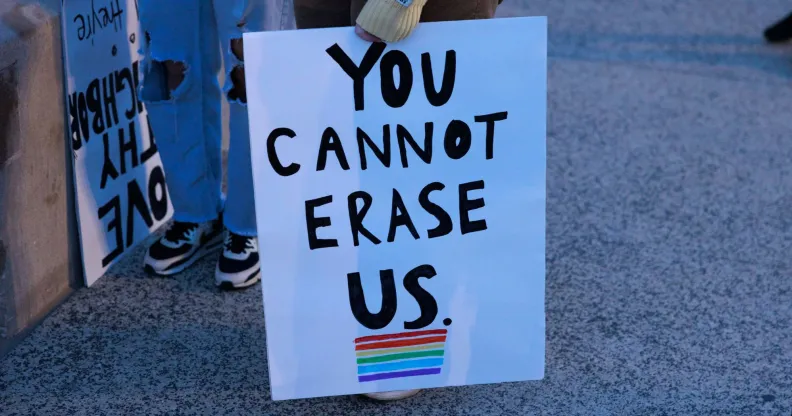New Republican bills seek to ban trans people from public spaces, and refer to them as ‘obscene’

A person holds a sign reading ‘You cannot erase us’ with a rainbow LGBTQ+ flag below it. (Getty)
Republican bills proposed in West Virginia include aims to ban trans people from public places, “cure” them and refer to them as “obscene matter”.
The triad of bills – Senate Bill 194, 195 and 197 – introduced in the state’s legislature this month propose extreme threats to West Virginian trans people.
Senate Bill 194, proposes a total ban on all gender-affirming care for trans people up to the age of 21. It further adds that therapists and social workers in the state should attempt to “cure” trans identities. The bill expands reach of a current ban on gender-affirming care for those under 18, passed in 2023, and classes being trans as a “sexual deviation”.
Under the provision of this bill medical professionals involved in providing gender-affirming care, and mental health care professionals and counsellors, are targeted. Facilitating such care for people under 21 would be deemed unlawful under the proposed law and punishable by revocation of licenses and substantial civil penalties.
The bill also includes whistleblower protection clauses and aims to prevent state funds from being utilised for gender-affirming treatment.
Speaking to independent trans Erin Reed, West Virginia activist Ash Orr said of the legislation: “This piece of legislation attacks our most basic values of privacy and control over our own bodies, and is based on misleading or even outright false ideas.”
Senate Bill 195 classes trans people as “obscene” and aims to ban “transgender exposure, performances, or display” to minors, essentially criminalising public presence of trans people.
Orr said: “This is a blatant attempt to criminalise and erase the trans community of West Virginia.”
Senate Bill 197, which refers to trans people “obscene matter”, aims to stop “obscene matter” from being within 2,500 feet of a school, classifying it as “indecent exposure”.
Together, the triad of bills threaten the rights of trans people in West Virginia, although none have yet been made law.
Reed said: “With the introduction of West Virginia’s anti-trans bills, the nationwide count for anti-trans legislation now stands at nearly 200 bills in the first 11 days of 2024.”
Orr concluded: “The rise in legislative attacks aimed at our community is concerning, but it shows the desperation of lawmakers and extremists who are against transgender rights.”

